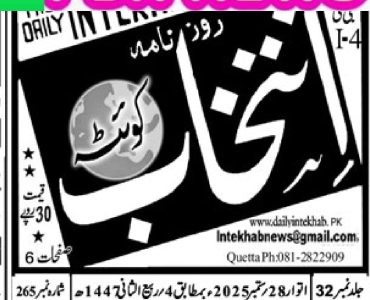International Day for Universal Access to Information 2025 Seminar Title: Ensuring Access to Environmental Information for Resilient Communities
International Day for Universal Access to Information 2025
Seminar Title: Ensuring Access to Environmental Information for Resilient Communities
Date: Saturday, September 27, 2025
Venue: Sohbat Pur, District Jaffarabad, Balochistan
On September 27, 2025, Transparency International Pakistan, in collaboration with the Gender and Empowerment Organization (GEO) Sohbat Pur, held a seminar titled “Ensuring Access to Environmental Information for Resilient Communities.” This event was organized to celebrate the International Day for Universal Access to Information (IDUAI). The main goal was to highlight how important environmental information is for helping communities prepare for climate related problems, improve transparency, and hold institutions accountable.
The seminar brought together people from different backgrounds, including members of civil society organizations, the Chairman of the Local Government Department, officials from the District Social Welfare and Education departments, and community members.
The event began with a recitation from the Holy Quran. In his welcome speech, Mr. Abdul Salam, CEO of GEO Sohbat Pur, said that Balochistan is one of the most climate affected areas in Pakistan, facing floods, droughts, deforestation, water shortages, and land issues. He said that places like Sohbat Pur and Jaffarabad are especially at risk because they have poor infrastructure and lack early warning systems.
Mr. Salam stressed that access to correct and timely environmental information is very important. He said that data about floods, forest protection, disaster planning, and weather alerts should be available to everyone so that communities can prepare and stay safe.
In the next session, Mr. Abdul Hae Khosa spoke about the Balochistan RTI Act 2021 and how it can help people hold the government accountable. He also shared key points from the Pakistan Climate Change Policy 2024, which focuses on helping communities become stronger, ensuring open governance, and preparing for climate disasters. He said people must have access to information about water use, land projects, and environmental policies to make these plans successful.
Later, Mr. Abdul Salam led a session on the RTI Act 2024, explaining that it gives citizens the legal right to request information from public departments. He said this law can help people to get important environmental data, monitor government projects, report delays or poor performance, and improve transparency in disaster planning.
He also talked about the important role of Civil Society Organizations (CSOs) in spreading awareness, training people on how to use RTI, and reporting issues in governance.
At the end of the seminar, participants took part in group discussions. They talked about what their communities need the most, such as reliable weather alerts, simple guides for disaster preparedness, easy to understand information. They also discussed problems like delays in getting information, lack of knowledge about RTI laws, government departments not responding.
Participants suggested solution such as awareness campaigns on RTI and organizing local training sessions, and setting up Community Information Centers to help people use the RTI Act.
The seminar ended with a strong message: access to environmental information is key to protecting communities from climate disasters. By using the RTI Act 2024 and supporting the Climate Change Policy 2024, communities in Balochistan can become more informed, more prepared, and more resilient.









